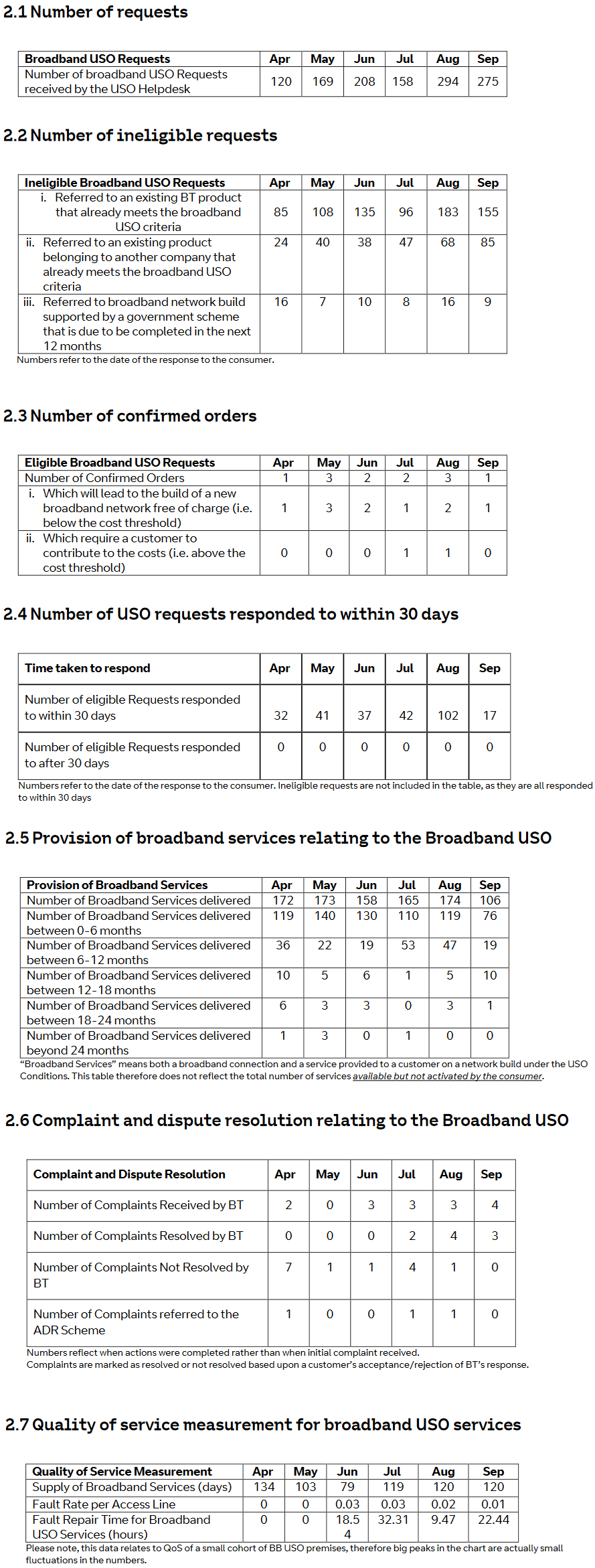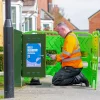October 2023 BT Progress Update on 10Mbps UK Broadband USO

UK ISP BT has published their latest biannual (October 2023) update on the progress they’ve made in delivering Ofcom’s flaky 10Mbps Universal Service Obligation (USO) for broadband. The operator has so far built a USO connection to over 7,681 premises (up from 7,000 in Apr 2023), with 185 further builds in progress (down from 800).
The obligation, which was introduced in March 2020, is aimed at those who can’t yet receive a 10Mbps or faster download speed and aren’t planned to get one in the next 12-months. Ofcom states that 62,000 UK premises currently fall into this gap (i.e. those outside of suitable fixed line, fixed wireless and 4G mobile coverage), or 428,000 premises if you exclude wireless solutions (here), but some homes are still too expensive for the USO.
Back in 2020 we reported on various examples (here) where people had been hit with quotes for excess costs that ran from tens of thousands of pounds and all the way up to £1-2m. Since then improvements have been made to the USO’s cost sharing model (here), but there’s no escaping the reality that some remote properties will simply NOT be economically viable to reach.
Advertisement
Many of those who pursue the USO option via BT (EE) say they were offered 4G (mobile broadband) based connections, but those actually considered to have been delivered under the USO itself usually get Fibre-to-the-Premises (FTTP). Commercial builds of the latter have also helped to shrink the USO gap – back in early 2020 Ofcom said that about 155,000 premises fell into the USO gap vs 62,000 today.
The gap will continue to shrink as commercial builds expand and the government’s £5bn Project Gigabit programme starts to make progress. The government are currently also exploring how best to reach those who live in “Very Hard to Reach” areas – roughly equating to the final c.0.3% of premises (the same sort of area as the USO is focused upon) – and at the same time they’re also preparing to review the USO (here).
BT’s October 2023 USO Report
The latest statistics show that the delivery of USO connections seems to be falling and at quite a rapid pace (e.g. a year ago there were 2,000 builds in progress, which fell to 800 in April 2023 and now 185). We suspect this may be a combination of factors, such as a lack of consumer familiarity with the USO (apply for it here) and the fact that the policy may also be starting to run into the limitations of economically viable deliverability.

Advertisement
Mark is a professional technology writer, IT consultant and computer engineer from Dorset (England), he also founded ISPreview in 1999 and enjoys analysing the latest telecoms and broadband developments. Find me on X (Twitter), Mastodon, Facebook, BlueSky, Threads.net and Linkedin.
« 5,000 Extra Doncaster Homes Get Virgin Media O2’s Full Fibre























































The Whole U.S.O. legislation is completely destroyed by the inclusion of 4g. As U.S.O. provider BT has deliberately made it’s product as unappealing as possible. Charging just below the threshold for a measly 15Mbs capped. Or way above the USO price cap for a still capped 30Mbs possibility. Just shows the only point of it’s product is to fulfill their obligations. But in the most unattractive package possible so they don’t have to. Hopefully the government will eventually pull their fingers out & get project gigabit moving. The entire of the U.S.O. was deeply flawed in it’s acceptance of other technologies. As this has just been used by BT to renaigue on their obligations & the government to shirk their responsibilities.
The article and your comment reminded me that the government consultation on reviewing the USO is still open for comments and I haven’t responded yet.
I totally agree with your comment. They have been offering that 15Mbps 4G product – over £50 per month on a 24 month minimum contract – in urban areas when the only reason they can’t meet the USO is because their FTTC cabinet is full. That may meet the letter of the USO but it does not, in my opinion, meet the spirit of USO.
In this situation an effective USO would require them to either increase FTTC capacity or do a small amount of FTTP overlay to relieve congestion at the cabinet. The current arrangement allows them, in effect, to sell a 4G router for £50 per month on a 24 month minimum contract and maintain their monopoly by preventing any other Openreach ISP from providing a USO-compliant service. It must be one of the most profitable retail products they sell.
I would assume most are very remote properties. I would have thought a point to point wireless link to the nearest Fibre would be a relatively low cost solution as long as the local geography is suitable and no large trees or hills in the way
Yes BT made the USO commitment however the proposal included 4G as a lower cost solution and that there was a £3,400 cap. It also assumed there would be a funding mechanism which has never materialised. Unlike social tariffs the USO may require investment in areas Openreach have no current plans so the OR costs are passed back directly to BT PLC.
BT can exclude itself if there are other fixed broadband providers but as we know Altnets are not providing 100% coverage particularly to the more difficult premises.
BDUK have awarded Procurement Lots to Altnets yet when you look at the maps in some cases it may have been more appropriate for USO coverage for them to be given to OR so the designated premises AND USO requirements can be met by the same infrastructure.
4G (and 5G) routers are readily available and those in need of USO do not have to take the BT/EE package if they have a suitable signal.
The USO was given when we were in a different place. Now some areas have 3 or 4 giga providers, VM has upped their game and Altnets are even competing between themselves. Meanwhile despite BDUK initiatives many are still languishing for the foreseeable on copper with very poor or no mobile signal (whole areas, pockets and individual premises).
With FTTP appearing at pace now, my view is the USO should be increased and Ofcom should seek a suitable funding model rather than simply expecting a commercial company in a competitive environment to simply absorb it. Where an area is covered by an alternative giga supplier (including VM) then they should take on the USO obligation and not simply miss out premises within the planned area.
Hopefully as OR FTTP areas are introduced and FTTC is removed it will release surplus kit that can be used to augment SOGEA and SOTAP (or a new variant?) in copper areas. But BT will need the incentive to pay OR to address it in parallel to their FTTP.
10Mbps USO is out of date and needs to be raised in my opinion. It’s barely suitable for streaming, let alone 4K. Cloud sync? Have fun with that. Family of 4? You’re going to have a bad time. Downloading 120GB Triple-A Steam games? You’d get better bandwidth with a truck on the highway with the DVDs in it. Doing anything productive other than sending email? “Sure”.
And we haven’t even started looking at the upload, which is likely to be.. Erm.. Terrible.
4K video is hardly a human rights issue, nor is gaming or cloud backup.
The USO is meant to provide sufficient connectivity to access web services: order goods, pay your bills, communicate via E-mail. These are things that are essential to modern life.
True, but the Internet has become a way of society these days. Honestly I don’t think you should be viewing it like that in this day and age. That’s a similar comparison to a water service where – “well it might be a trickle, but if you fill up bottles and take care, you’ll have enough for a shower each day, but don’t fear! It’s enough water to stay alive”. 10Mbps is a ludicrously low target imo.
the 10Mbps in this case is a water supply that’s more than adequate for drinking, cooking and cleaning, but you want to be able to fill your pool with it
it’ll do the basic tasks, it’ll be fine for streaming HD, etc. I would hope that BT, where possible, uses the best available technology – but if it really is going to cost many thousands to run fibre, why should their other customers have to subsidise it?
In reality – chances are if they are going to deploy to satisfy USO, it’s not going to be copper. It will be a standard FTTP deployment. Why make the effort to run out fiber and not go the final mile.
I’d love to understand how they arrive at these huge costs for running fibre to rural areas. When an area is fed via overhead lines, it’s incredibly quick, easy, and inexpensive to run fibre.
I deal with quite a few fibre installers here in london working for operators in London, and they also work for alt net operators targeting rural areas. They tell me that everyone is just milling project gigabit for it’s worth.
Meanwhile, we have plenty of urban not spots which will have residents left behind for years to come.
ThinkBroadband is suggesting the dominance of Openreach is declining. Clearly with lots of Altnets there is some decline but Openreach is still the dominant player by a very wide margin